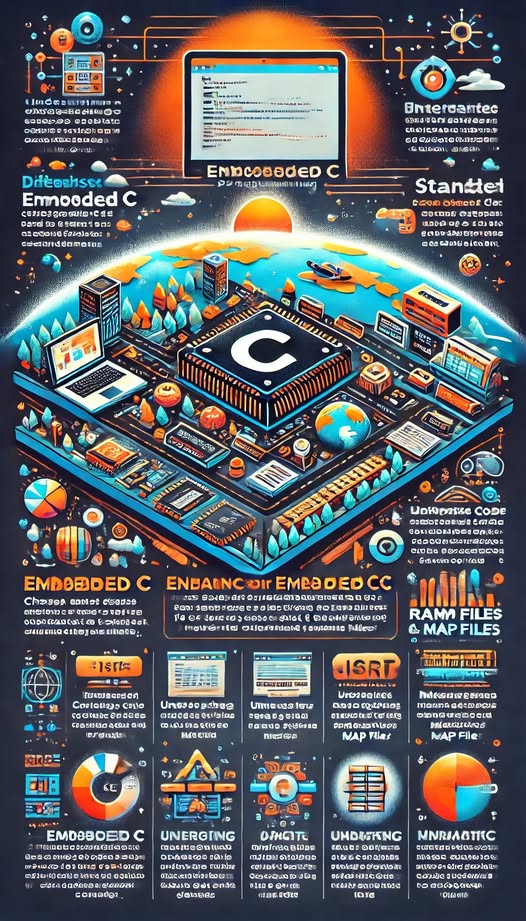
About Course
🔧 Course Title:
Mastering Embedded C Programming for Microcontrollers.
Code: 11008-PEM
📘 Introduction:
Embedded C is the backbone of real-time systems that control everything from home appliances to automotive systems, industrial robots, IoT devices, and aerospace applications. Whether you’re working with 8-bit AVR microcontrollers, 16-bit PICs, or 32-bit ARM Cortex-M processors, mastering Embedded C is critical for developing efficient, optimized, and reliable firmware.
This course dives deep into how C interacts directly with microcontroller hardware, how to write efficient code that manages memory, interrupts, and real-time behavior — and how to structure your projects like a professional embedded engineer.
🧾 Course Description:
This comprehensive hands-on course is designed for engineers, developers, and students who want to transition from beginner-level microcontroller programming to real-world embedded C development.
The course will bridge the gap between standard C and embedded C, showing how to control registers, manage memory, optimize performance, and organize large embedded applications into scalable projects. It will also explore how compilers, linkers, and memory maps influence your embedded code.
We’ll use real microcontroller targets (such as AVR, STM32, or ESP32) with examples and exercises, but the concepts are platform-independent, so you’ll gain skills applicable to any embedded system.
🎯 Course Objective:
To equip learners with advanced Embedded C programming techniques, system-level understanding, and best practices for developing robust, scalable, and efficient embedded applications across different microcontroller architectures (8-bit, 16-bit, and 32-bit).
👥 Target Audience:
-
Embedded Systems Engineers
-
Electrical/Electronics Engineers
-
Computer/Embedded Software Developers
-
Engineering Students (Intermediate to Advanced Level)
🕐 Course Duration:
40+ Hours (Includes theory, labs, and assessments)
🗂️ Course Modules Breakdown:
Module 1: Introduction to Embedded C
-
What is Embedded C?
-
Differences between Embedded C vs Standard ANSI C
-
Embedded C Language Extensions (Keywords, Addressing, etc.)
-
Overview of Development Flow (Edit → Compile → Flash → Debug)
-
Popular Compilers: Keil, MPLAB XC8/XC16/XC32, IAR, GCC
Module 2: Microcontroller Architecture Primer
-
8-bit vs 16-bit vs 32-bit Microcontrollers
-
Memory Map and Bus Systems
-
Role of RAM, ROM, EEPROM, Registers
-
Common Architectures (AVR, PIC, STM32, MSP430, etc.)
Module 3: Data Types and Memory Efficiency
-
Choosing Correct Data Types for Architecture
-
uint8_t,uint16_t,uint32_t,int_fast8_t, etc.
-
-
Bit-fields and Memory Optimization
-
Endianness and Data Alignment
-
Type Conversion and Overflow Considerations
-
Case Study: RAM Usage Analysis on 8-bit and 32-bit MCUs
Module 4: Code Modularity and Scalability
-
Modular Code Structure: Headers, Source Files, Makefiles
-
Static vs External Variables
-
Role of
extern,static, and inline functions -
Separation of Drivers, Application Layer, and Hardware Abstraction
-
Example: Modular Blinking LED with Peripheral Drivers
Module 5: Interrupt Handling (ISR Design)
-
What is an Interrupt?
-
Interrupt Vector Table
-
Writing Efficient Interrupt Service Routines (ISRs)
-
Nested Interrupts, Priorities & Latency
-
Shared Variables and Volatile Keyword
-
Critical Sections and Atomic Access
-
Practical ISR Design with Timers and External Interrupts
Module 6: Compiler Internals & Toolchain
-
What Happens from Code to Binary?
-
Compiler, Assembler, Linker Workflow
-
Understanding
.prm,.ld, and Linker Configuration Files -
Interpreting Map Files: Code Size, Symbol Lookup
-
Case Study: Analyzing a Map File from Compilation
Module 7: Memory Management in Embedded Systems
-
Stack vs Heap vs Static Memory
-
Fixed Memory Allocation: Arrays, Structs, Buffers
-
Dynamic Memory (and why to avoid it in small systems)
-
Memory Corruption Issues and Debugging Techniques
-
Memory Protection Techniques (MPU/MMU intro for Cortex-M)
Module 8: Performance Optimization Techniques
-
Code Size vs Speed Trade-offs
-
Compiler Optimization Levels and Flags
-
Loop Unrolling, Inline Assembly
-
Debouncing, Delay Optimization
-
Profiling and Benchmarking Code
-
Power-aware Programming for Embedded Devices
Module 9: Direct Register Programming vs HAL
-
What are Registers in MCUs?
-
SFRs (Special Function Registers) and Bit Masking
-
Direct Register Access vs Using HAL Libraries
-
Examples:
-
Configuring GPIO using Registers
-
Using Datasheets to Access Timers, UARTs, etc.
-
Module 10: Project: Build a Real-World Embedded Application
-
Full Lifecycle: Plan → Code → Optimize → Debug → Deliver
-
Example Project:
-
Embedded Weather Logger
-
ISR + UART Communication + Sensor Reading + Power Optimization
-
-
Project Breakdown:
-
Modular Driver Design
-
ISR with Timer & UART
-
Efficient Data Handling & Circular Buffer
-
Final Deployment & Debugging
-
🧪 Hands-On Labs & Exercises:
-
Writing ISR with Timers and External Interrupts
-
Creating Modular C Project with Driver Abstraction
-
Analyzing Memory Map from a Compiled Program
-
Comparing Performance Between Optimized and Unoptimized Code
-
Implementing a Mini RTOS Task Scheduler
-
Flashing Code to Real Hardware (STM32, AVR, or ESP32 via C)
📚 Supplementary Materials:
-
Code Templates and Starter Projects
-
MCU Datasheets and Reference Manuals
-
Embedded C Style Guide
-
Cheat Sheets for Bit Manipulation, ISRs, Optimization
-
Map File Analysis Examples
✅ Assessment & Certification:
-
Mid-Course Quizzes (Per Module)
-
Final Practical Project
-
Certification of Completion (Performance > 70%)
🎓 Learning Outcomes:
By the end of this course, participants will:
-
Write optimized, scalable, and modular Embedded C code
-
Analyze memory use and improve performance
-
Handle interrupts confidently
-
Understand toolchain internals and compile-time details
-
Master register-level programming and avoid HAL pitfalls
Course Content
🔧 Mastering Embedded C Programming for Microcontrollers
Student Ratings & Reviews



